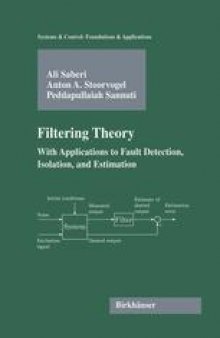 جزییات کتاب
جزییات کتاب
The focus of this book is on filtering for linear processes, and its primary goal is to design filters from a class of linear stable unbiased filters that yield an estimation error with the lowest root-mean-square (RMS) norm. Various hierarchical classes of filtering problems are defined based on the availability of statistical knowledge regarding noise, disturbances, and other uncertainties.An important characteristic of the approach employed in this work for several aspects of filter analysis and design is structural in nature, revealing an inherent freedom to incorporate other classical secondary engineering constraints—such as placement of filter poles at desired locations—in filter design. Such a structural approach requires an understanding of powerful tools that then may be used in several engineering applications besides filtering.Key features and topics covered:* Provides an in-depth structural study of powerful tools such as Riccati equations, linear matrix inequalities, and quadratic matrix inequalities.* Develops a general and structural theory of H2 and H-infinity optimal filtering as well as generalized H2 and H-infinity optimal filtering in a broad framework with an extensive and complete analysis and synthesis of filter design.* Examines several hierarchically ordered layers of noise decoupled filtering problems under a single umbrella.* Illustrates the application of filtering theory to fault detection, isolation, and estimation.Filtering Theory is aimed at a broad audience of practicing engineers, graduate students, and researchers in filtering, signal processing, and control. The book may serve as an advanced graduate text for a course or seminar in filtering theory in applied mathematics or engineering departments. Prerequisites for the reader are a first graduate course in state-space methods as well as a first course in filtering.
 درباره نویسنده
درباره نویسنده
علی صابری سیاستمدار اصلاحطلب، عضو هیئت مدیره کانون وکلای دادگستری مرکز و عضو روشندل چهارمین دوره شورای اسلامی شهر تهران است.



 دانلود کتاب
دانلود کتاب

 جزییات کتاب
جزییات کتاب
 درباره نویسنده
درباره نویسنده





 این کتاب رو مطالعه کردید؟ نظر شما چیست؟
این کتاب رو مطالعه کردید؟ نظر شما چیست؟
